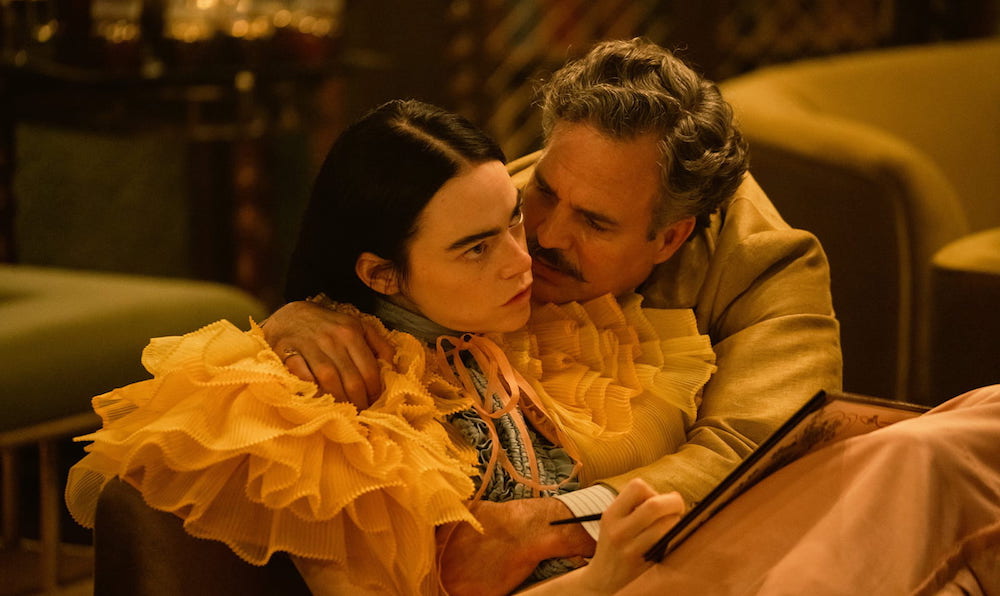Warning: Spoilers ahead!
“Poor Things” begins at the end.
A woman stands on the ledge of the bridge under a gorgeous troubled sky. Her dark blue gown looks hypnotic against the backdrop. Her face comes into view. Her dark hair is up in a bun and she’s wearing pearl drop earrings.
We see a teary look of resignation into helplessness—the only instance the expression appears on Emma Stone’s face throughout the movie. Immediately, you can tell this is not Bella Baxter. Once the thought sinks in, the woman throws herself into the waters of the Thames.
There are two lines from Bella Baxter (Emma Stone) that stand out to me now. “Kiss me and set me forth,” she tells her father figure and creator Dr. Godwin Baxter (Willem Dafoe) when she rejects his attempt to stop her from running away with the debauched Duncan Wedderburn (Mark Ruffalo) to go adventuring. “I am a ‘changingable’ feast. As are all of we,” she says, crediting Emerson, to Duncan when he shows contempt for her newfound “intellectual” pursuit.
“Poor Things” is a funny feast for the senses that regards itself as a search for the meaning of freedom. But in actuality it is more of an invitation to understand the tricky human condition, which is what Yorgos Lanthimos films are at the core.
@oscars 'Poor Things,' screenplay by Tony McNamara. Nominated for Writing (Adapted Screenplay) at the 96th Oscars. Tune into @abcnetwork to watch the Oscars LIVE on Sunday, March 10th at a new time, 7e/4p! #oscars #oscars2024 #academyawards #poorthings #emmastone #willemdafoe #writing #adaptedscreenplay #moviescript #movies @searchlightpics ♬ original sound – The Oscars
On children as property
Based on novelist Alasdair Gray’s 1992 quasi-feminist Victorian pastiche reimagining of “Frankenstein,” Lanthimos’ film invites us to live vicariously and explore an unfamiliar world through Bella across accelerated stages of her life (thanks to a ghastly brain transplant).
A number of reviewers have likened it to Greta Gerwig’s “Barbie” not just for their fish out of water narratives but also for the way they both left many viewers unsatisfied with the films’ impressions on women’s liberation.
Set in a Hieronymus Bosch-inspired surreal semi-steampunk world of Victorian anachronism with painted backdrops similar to “Black Narcissus” and captured by wide-angled lensing, we see Bella’s world through alien eyes as well. After that jarring opening, we are transported to the operating theater and madhouse of God—as Bella affectionately calls her father figure. The scenes in this chapter are in black and white, signaling that we’re looking with newborn eyes with Bella.
In God’s home filled with hybrid animals and corpses, Bella is only discouraged from doing one thing: leaving. God listens to her, lets her make messes, and regards her with the patience and oddball compassion of a fellow outsider. This unorthodox upbringing encourages Bella’s openness. Even when she masturbates at the dinner table after discovering sexual pleasure, she isn’t shamed by the enamored assistant Max McCandles (Ramy Youssef) but rather informed that it’s more a private activity.
But when Bella decides that she wants to explore the world and throws a tantrum when their little outing is cut short, God uses a handkerchief with chloroform to keep her quiet and pushes Max to marry her so he can keep her under his controlled environment.
However, when she asserts her agency and desire to explore the world, he lets her go without punishment. Not that God has clear ideas about what punishment is. He later reveals (and defends) that his father mutilated his genitals “in the name of science and progress.” Maybe withdrawing his control is his way of subconsciously differentiating himself from his father. God is Frankenstein and also a monster. Succumbing to cancer in the end and leaving Bella his surgical practice could be interpreted as God trying to pull her away from the passive acceptance drilled into him. But for Dafoe, it was more of a generosity born out of how much he missed her.
@searchlightpics Watch Willem Dafoe and Ramy Youssef take POOR THINGS from script to scene. Experience POOR THINGS, nominated for 11 Academy Awards including BEST PICTURE. Now playing in theaters everywhere. Get tickets! #PoorThingsFilm ♬ original sound – Searchlight Pictures
Curiosity capacitated and kindness constrained by class
When Bella arrives in Lisbon with Duncan in the next chapter, she’s insatiable and the world turns into a technicolor dessert waiting to be devoured. Here we also really get to revel in Bella’s extraordinary wardrobe that played with 1890s silhouettes and big sleeves. Unbound by sartorial codes and not as knowledgeable in dressing herself yet, Bella often pairs her beautiful tops with her frilly knickers, the easier to pull down for sex. And she keeps her hair down like Egon Schiele’s muse in “Nude Girl Standing With Long Black Hair & Blue-Black Drape.”
After one of her sex marathons with Duncan, she explores the streets of Lisbon alone. There, she feels unpleasant fear for the first time after witnessing an argument. She surmises when she gets back to a panicked Duncan, “I have adventured and found nothing but sugar and violence. It is most charming.” Bella doesn’t approach the world looking to pass a right or wrong judgment. And it becomes increasingly clear that it’s because her class status keeps her from being directly affected by (most) social issues despite being a woman.
When Duncan starts pushing Bella to follow the rules of polite society after a dinner where she almost punches a crying baby, her annoyance at him comes as a bit of a surprise. This escalates into resentment when Duncan mopes and starts picking fights in his desperate need to keep Bella to himself. “Your sad face makes me discover angry feelings for you,” she tells him, unwilling and not needing to make sacrifices to satisfy his fancy.
@searchlightpics Watch Emma Stone and Mark Ruffalo take POOR THINGS from script to scene. POOR THINGS, now playing in theaters everywhere. Get tickets now. #PoorThingsFilm ♬ original sound – Searchlight Pictures
When Duncan basically kidnaps Bella out of jealousy and traps her on a ship with him, their companionship cracks even more and Bella seeks out new friends. It is all the more apparent that Duncan doesn’t respect her own personhood when he tells her that he doesn’t like her interest in books and how she’s losing her “adorable way of speaking.” Her disregard for his opinion hurts his ego even more.
@searchlightuk Dont let anyone stop you from achieving your 2024 reading goals. Poor Things. A film by Yorgos Lanthimos. In UK cinemas January 12th. #PoorThingsFilm #EmmaStone #MarkRuffalo ♬ original sound – SearchlightUK
But Bella finds out that you can’t learn everything through reading books. She gets a harsh wakeup call when her friend Harry shows her a glimpse of extreme poverty and hunger during a stopover in Alexandria. She falls to despair, filled with guilt and unable to grasp why some people are left to die while others, like herself, live in comfort. It gives her some sense of relief when she (unsuccessfully) gives away all of Duncan’s money to the poor and they’re left to “survive” with nothing but the expensive clothes on their backs when they get kicked off the ship in Paris. Of course, Bella never really understands socioeconomic struggles.
Autonomy in sex
But economic class disparity isn’t really something tackled at length. It makes sense since Bella has that wad of cash sewed into her blanket and she could have always asked for money to be wired. She didn’t turn to prostitution and charge a mere 30 francs because she didn’t have any other choice.
To me, Bella’s time as a prostitute wasn’t designed by the film to be discussed as a gendered experience. But what I found interesting is how it seemed to be critical of prostitution in some ways despite Bella’s sexual proclivity being framed as an aspect of a liberated woman.
At this point, Bella’s mind has almost caught up to her body. And she does start forming stronger opinions on bodily autonomy and even questions the brothel’s system, which doesn’t take into account the prostitutes’ preferences. The film seems to regard her odd array of cartoonish male customers with disgust. Bella finds amusement and peeks into the human condition through them—until she doesn’t.
Bella finds herself in absurd sexual arrangements but we don’t hear her directly vocalize whether or not she thinks she’s being taken advantage of. She doesn’t resent brothel owner Madame Swiney who convinced her with the (sly) words: “We must experience everything. Then we can know the world. And when we know the world, the world is ours.”
When Bella returns home after finding out about God’s diagnosis, she has a discussion on her time as a prostitute with Max where any complicated feelings she had about her time is swept under the rug. He tells her, “It is your body, Bella Baxter. Yours to give freely.”
@searchlightpics Know your worth. #PoorThingsFilm ♬ original sound – Searchlight Pictures
The Guardian describes the film as “a heterosexual middle-aged man’s fantasy about nymphomania, with the flimsiest covering of ‘satire’” which leads me to believe that whatever attempt at nuance was ineffective for a lot of us.
A premature ending note on domestic violence and marriages
By the end, we uncover Bella’s mysterious past when her husband from her past life appears. We discover his cruelty and her complicity to it in her previous life despite living a caged existence. Just when we think things will escalate, Bella is quick to put him under her surgical knife and she lives happily ever after training to become a surgeon after God.
“Ideally, a movie as allegedly confrontational as ‘Poor Things’ would find a way, at the moment of truth, to either confound our expectations or else genuinely go for the jugular, which is why it’s so disappointing that Lanthimos opts for plan C: a wishy-washy anticlimax followed by a quasi-surrealist coda, topped off by a sight gag with all the toothless whimsy of a shitpost—the cinematic equivalent of clout chasing. There are worse things for a filmmaker to want than to be liked, but that doesn’t mean they can’t do better, either,” Adam Nayman writes for The Ringer.
Like other modern fairytales, this story is neatly tied up and we feel as if we’re being asked to find profound meaning in text with deceptive depth. But maybe the people behind “Poor Things” are neither gunning for that feminist distinction nor concerned with directly tackling the issues it touches on.
Is it Oscar Best Picture material? Maybe not. Does it make for a fun movie-going experience? Hell yes. And for some that’s enough.
Photo by Atsushi Nishijima from Searchlight Pictures
Follow Preen on Facebook, Instagram, Twitter, TikTok, YouTube, and Viber


